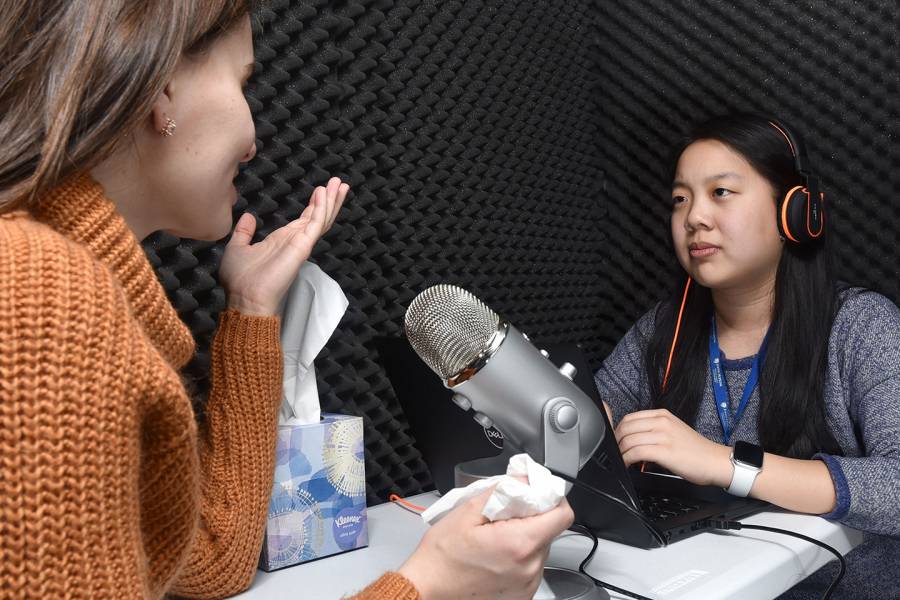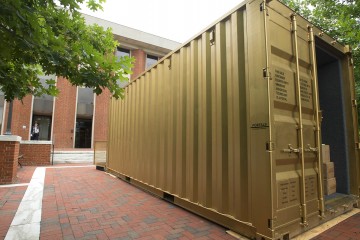In the six-minute recording, the woman's voice sounds warm and untroubled as she recalls the most frightening experience of her life: receiving a diagnosis of breast cancer.
"I was 49," she says. "I had been an athlete—mountain bike racing and doing all sorts of things—so this hit me as quite a shock." Now cancer-free for 12 years, she describes her treatment and reflects on her experience as a patient.
"I learned a lot about the medical profession," she says. "Many doctors are very supportive, but a lot of them are so busy. … They can't read your mind, and you have to be very forward-thinking and talkative and ask questions and be part of your whole process."
The audio—which does not include identifiable information about the patient, her medical providers, or any hospital—is part of a project called MyPaTH Story Booth, which is collecting health care stories at a network of hospitals including the Johns Hopkins Hospital.
The goal is twofold: to create a trove of patient and family caregiver stories for others who are going through similar situations, and to give clinicians information that helps provide better patient-centered care.
Also, through the act of storytelling, patients create a narrative that might help them make sense of a difficult time in their lives, says research program coordinator Lilly Su, who staffs the booth and guides the interviews.
"Story Booth gives us an opportunity to engage with patients and their caregivers in order to gain insights and better understand their experiences with health care," says Cheryl Dennison Himmelfarb, a professor at the Johns Hopkins School of Nursing who has joint appointments at the schools of Medicine and Public Health. "We aim to apply our learning to improve patient-centered approaches to health care and research."
The project, funded with a Patient-Centered Outcomes Research Institute grant, is collecting information in the PaTH Clinical Data Research Network, which includes the Johns Hopkins University and Health System as well as health systems and medical schools in Pennsylvania, Ohio, and Michigan. (The letters in PaTH stand for some of the participating institutions, P for Penn State University and University of Pittsburgh, T for Temple University, and H for Johns Hopkins.)
A soundproof booth, currently located at the Johns Hopkins Outpatient Center, travels from institution to institution, collecting stories from patients and caregivers. "We'd love to hear your point of view," reads a sign outside the booth. The invitation is not limited to Johns Hopkins patients. Su also goes to Lexington and Northeast markets, in Baltimore, where she invites people to tell their stories on-site or by calling in later. The only requirement is that participants be 18 or older.
The booth contains a chair, a microphone, and tissues to wipe away the tears of emotional memories. Su brings in a folding table and joins participants in the booth, listening and then prompting more conversation with questions like: What advice would you give others going through a similar situation?
Most stories are told by patients, though sometimes the family caregivers do the talking. Occasionally, patient and caregiver share the microphone to offer different perspectives on the same events. The stories, edited only to remove identifying information, usually run between six and 20 minutes.
In one recording, a patient talks about the consequences of being diagnosed with bipolar disorder when her difficulties actually stemmed from a thyroid condition.
Another storyteller describes the kidney transplant that saved his life. "I'm married now, I have four children," he says. "My oldest son is named after the physician who did my transplant."
As for the woman with breast cancer? Treatment was rough, she says. "You become kind of a mess, with your body feeling like it's not even yours anymore."
But she stayed strong through surgeries, chemotherapy, and radiation by telling herself things would get better.
And they did. These days, the woman skis, hikes, and spends time with her granddaughters. "I feel like if I had to go through this process," she says, "it's made me even more of who I am, and a stronger person."
Story Booth has been in use at Johns Hopkins since December and will stay through August before moving to another PaTH network location. The booth is open weekdays, except Wednesdays, from 10:30 a.m. to noon and from 2 to 4 p.m.
This article first appeared in The Dome.
Posted in Health
Tagged patient experience









